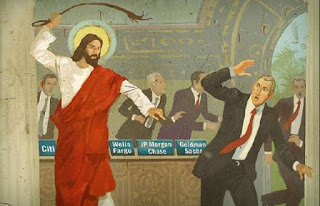Micheal Hudson has a new book out in Easter called, … And Forgive them their Debts: Credit and Redemption. He is a distinguished professor of economics and is also a historian of economic systems and world's economies. He says that the word sin in the bible also meant debt in biblical times so for much of the time Jesus was referring to debt, not sin. As we turn towards our faiths this Christmas and Hanukkah in an attempt to make sense of the year that was, economist Professor Michael Hudson says we have been interpreting the bible incorrectly. And he has written an entire book about it. Rather than sex and sin, both Christianity and Judaism is preoccupied with debt. As it turns out, Jesus was a socialist activist who paid the ultimate price fighting for the reinstatement of regular
Topics:
Mike Norman considers the following as important:
This could be interesting, too:
Robert Vienneau writes Austrian Capital Theory And Triple-Switching In The Corn-Tractor Model
Mike Norman writes The Accursed Tariffs — NeilW
Mike Norman writes IRS has agreed to share migrants’ tax information with ICE
Mike Norman writes Trump’s “Liberation Day”: Another PR Gag, or Global Reorientation Turning Point? — Simplicius
Micheal Hudson has a new book out in Easter called, … And Forgive them their Debts: Credit and Redemption. He is a distinguished professor of economics and is also a historian of economic systems and world's economies. He says that the word sin in the bible also meant debt in biblical times so for much of the time Jesus was referring to debt, not sin.
As we turn towards our faiths this Christmas and Hanukkah in an attempt to make sense of the year that was, economist Professor Michael Hudson says we have been interpreting the bible incorrectly. And he has written an entire book about it. Rather than sex and sin, both Christianity and Judaism is preoccupied with debt. As it turns out, Jesus was a socialist activist who paid the ultimate price fighting for the reinstatement of regular debt jubilees. In fact, the rulers of classical antiquity who cancelled their subjects’ debts were overthrown with disturbing frequency and tended not to live that long…
“The Christianity we know today is not the Christianity of Jesus,” says Professor Hudson.
“Most religious leaders say that Christianity is all about sin, not debt,” he says. “But actually, the word for sin and debt is the same in almost every language.”

